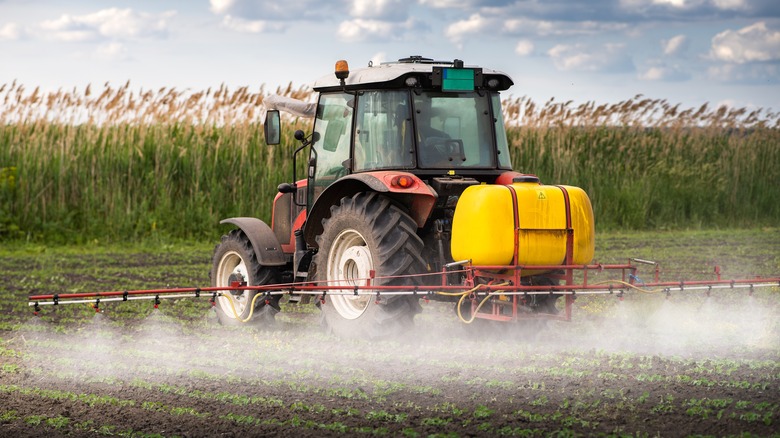There's A Ridiculous Amount Of Pesticide In Fruit Leather
What exactly is fruit leather? The National Center for Home Food Preservation describes it as pureed fresh fruit that has been spread out, dried, and rolled up — like a more natural version of the '90s fruit snacks known as Fruit Roll-Ups. The finished product has a texture that's similar to a strip of leather, though it fortunately doesn't have the taste to match. These subtly sweet snacks are easy to find at many stores around the country, like Walmart and Trader Joe's.
A study in the National Library of Medicine reports that fruit leathers contain "substantial quantities of dietary fibers, carbohydrates, minerals, vitamins, and antioxidants," thanks to the use of real fruit as a primary ingredient. Because of this, and because of their absence of artificial sweeteners and colors, many people perceive fruit leathers as a healthier alternative to processed fruit snacks.
Or are they? Could it be that every time you enjoy these supposedly "healthy" fruit snacks, you're actually consuming large amounts of chemicals?
Why are fruit leathers contaminated with pesticides?
New data released by the Environmental Working Group reveals that fruit leathers can contain "high concentrations" of common pesticides. Tests performed on organic and conventional fruit leather, tested from a variety of brands and retailers in 2021 and 2022, revealed that each sample contained some level of pesticides, theorized to have been introduced to the fresh fruit during the growing process. Fruit leather samples from the Stretch Island and Bob Snail brands were found to contain residue from more than 10 different pesticide types.
Because fruit leather is typically advertised as a kids' snack, children are at the highest risk of consuming these traces of pesticides, which have been linked to "pediatric cancers, reduced cognitive function, and behavioral issues" when consistently consumed early on in life. The Environmental Protection Agency notes that work is done to ensure that the pesticides used in farming will cause as little harm to people as possible while still preventing the destruction of crops.
The data is a reminder that an organic label doesn't guarantee the absence of pesticides in your food. In reality, per Dennis L. Patton, M.S. and horticulture agent from Kansas State University, organic foods can be sprayed with pesticides "derived from natural sources" and still contain residue from these pesticides once they reach your home. It's unclear which types of pesticides the EWG detected in its study, but the fruit leathers with the lowest levels were those from The Froot Thief and Walmart's Great Value brand.

